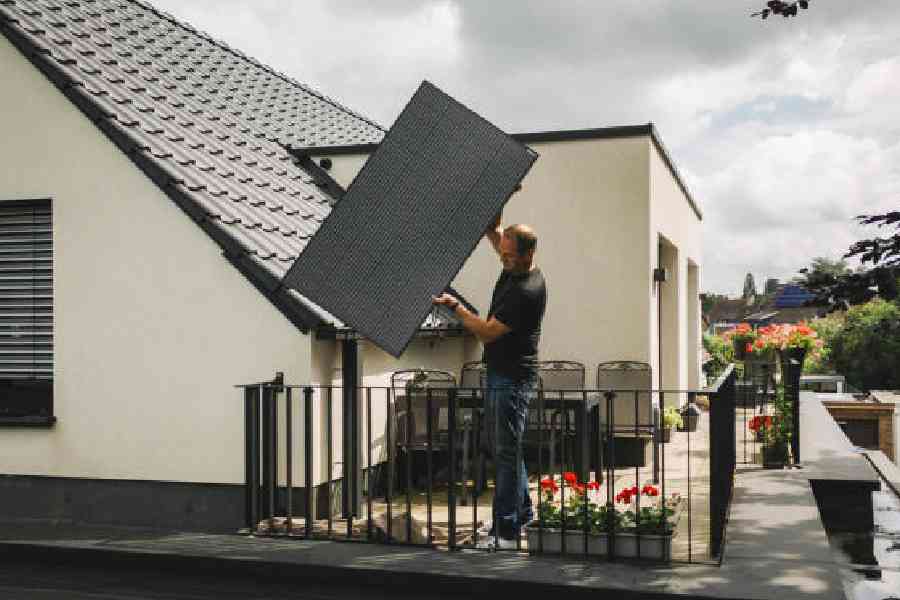At a Berlin trade fair for sustainability, a new gadget caught Waltraud Berg’s eye — a solar panel small enough to be easily installed on the side of a balcony and plugged into a wall socket to feed energy into her home.
“I was thrilled to learn that you can generate your own power,” said Berg, a retiree who installed several panels on the south-facing balcony of her Berlin apartment by herself.
Each of the lightweight panels produces only enough electricity to charge a laptop or run a small refrigerator. “You don’t need to drill or hammer anything,” Berg said. “You just hang them from the balcony like wet laundry in Italy.”
More than 5,00,000 of the systems have already been set up across Germany, and new laws that relaxed rules around solar panel installation have contributed to a boom in use. In the first six months of the year, the country added 9 gigawatts of photovoltaic capacity, according to the Federal Network Agency, a German regulator.
Said Klaus Müller, president of the agency, “Compared to the total capacity at the end of 2023, almost 10 per cent more solar capacity was added. Of that, two-thirds was installed on buildings, which includes balcony systems.”
As part of its push to move away from dependence on Russian natural gas, the European Union is looking to quadruple the amount of power generated through photovoltaic sources by 2030, to 600 gigawatts. Germany aims to reach one-third of that amount by the same year. This year, Germany is expected to add more solar power capacity than any other European country, according to Rystad Energy.
Some of the solar panels sold in Germany are made by European companies, but most are produced in China, whose dominance of the global industry allows it to deliver solar panels at increasingly lower costs, said Nicholas Lua, an analyst with Rystad Energy.
In the early 2000s, Germany encouraged people to instal solar panels on the roofs of their homes by rewarding them with payments, known as feed-in tariffs, for sending energy to the grid. But those have become less lucrative in recent years, making such large-scale investments less attractive.
The plug-in systems involve routing the direct current generated by the panels to an inverter, which converts it to an alternating current. They can then be plugged into a conventional wall socket to feed power to a home.
Janik Nolden, who together with two friends founded Solago, a German start-up that sells rooftop solar panels and the plug-in versions, said most of his customers were interested in installing the panels on their own. Most of the panels he sells are produced in China, which makes better quality and less expensive panels than anything being produced in Europe.
Prompted by questions from do-it-yourselfers, Nolden started posting videos online explaining how the panels work, as well as how to plan, instal and optimise them. “DIY is the future,” he said. The company, which opened in a small storefront in a suburb of Dusseldorf, Germany, has since grown to a fill a warehouse roughly the size of a New York City square block, with 50 employees helping ship eight trucks worth of deliveries.
Elsewhere in Europe, plug-in solar panels are popular in the Netherlands, and interest is growing in France, Italy and Spain, in part driven by a steady drop in prices.
In Germany, individual plug-in panels sell for as low as 200 euros (about ₹ 18,600). Complete sets, including mountings, an inverter and cables, are about twice that cost.
Electricity prices in Germany jumped after Russia invaded Ukraine, and have now settled at around 25 euro cents per kilowatt-hour. But they remain among the highest in Europe.
Adding to the appeal in Germany are recently passed laws that effectively prevent landlords and co-op boards from blocking solar panel installations and drop some of the cumbersome registration requirements.
Together, these changes have made the idea of installing a personal solar system attractive to a wider consumer base.
“We are seeing more diversity, more older people, more women,” said Christian Ofenheusle, who founded and runs EmpowerSource, an enterprise that promotes small-scale solar use. A growing user group is young people with families who are concerned about climate change. “They say they want to make a contribution,” he said.
NYTNS











